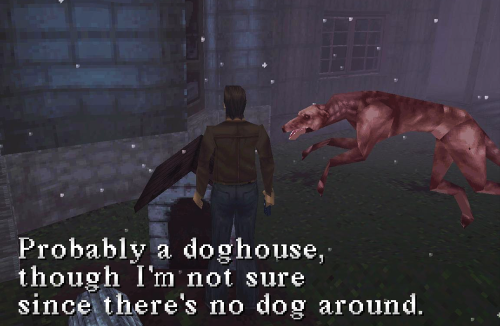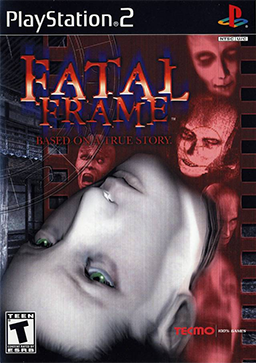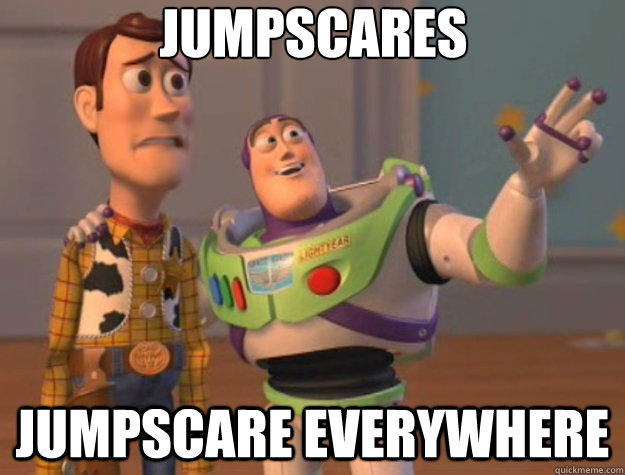The common complaint I hear about horror games is that...well...there aren't any. At least not within the big budget, AAA titles that come out on the current console generation. Where as Resident Evil once dominated the survival horror genre, the latest titles of the series have been geared more towards action/adventure than horror. Why is this? Well, let's just dissect a few of the concerns involving this genre.
Horror Games Just Don't Have The Same Charm Anymore
This is probably one of the least common complaints about horror in video games, but it's still something that deserves some attention. What happened to effect of horror in games? Why is it that previous console generations seem to have more of an impact on players than those of the current console generation?
Well, this is in part on the fact that developers are capable of doing a lot more in video games than in previous console generations. Just take a look at the original Silent Hill. Remember the creepy fog that covered the whole town? Well, that wasn't just for atmosphere. See, the PlayStation wasn't capable of rendering more than a few hundred polygons at a time. The fog was placed there to hide buildings, and other objects in the distance that hadn't been rendered yet. Another great example would be one of my personal favorite horror survival games of all time, Fatal Frame.
One of the few ghost stories I'll forgive for adding "based on a true story" to their marketing pitch.
First, lets look at the ghosts in Fatal Frame. Why were they so scary? Well, because they were so vague. Even when you could make out what the ghost was they were so far off the uncanny valley that they barely resembled anything human. This wasn't, for the most part, intentional. This was due to the low processing power of the PlayStation 2. The effect of this, however, was leaving the player's imagination to fill in the gaps. Nothing will terrify you more than your own imagination.
Also, another common mechanic that attributed to the effectiveness in horror games in previous console generations were the controls. Controls weren't intentionally clunky, and awkward in these games. Truth is, horror games of the time weren't really sure how to utilize the player controls, and mostly relied on games before them. Resident Evil, and Fatal Frame both used almost mirror identical controls/camera angles as Alone in the Dark. The fact that these controls and camera angles were so awkward, and clumsy helped add anxiety to the players.
I'm not saying that big budget, AAA titles can't make a decent horror game using the improved capabilities of current, and future console generations. I just don't think they've found an effective alternative to the conventions of yesteryear. The closest I've seen is Dead Space, but even that game relies heavily on being so dark that most of the area is hidden. Maybe as developers toy with more mechanics we'll see something, but, as of now, the indie scene seems to hold the grasp on horror titles (which isn't necessarily a bad thing).
Horror Games Rely Too Heavily on Jump Scares
This is probably one of the most common complaints about horror games. Every time I look up a video about any horror game (be it a big budget title, or an indie title) one of the major complaints I see are about the game's reliance on jump scares, or questions regarding whether or not there are jump scares. This isn't new, either. I remember people complaining about jump scares back in the PlayStation/Nintendo 64 days.
Dead Space in a nutshell.
To be honest, in my opinion, jump scares are a more effective tool in video games than any other medium. For an example, let's take another look at Dead Space. This game comes under constant fire for using jump scares pretty much throughout the game. Many people view them as cheap attempts at simulating horror, but I'd like to present an argument to that statement. Dead Space is effective because it primarily uses jump scares, but it uses them responsibly. If the game was nothing but a series of jump scares the novelty would wear off pretty quickly. Instead they programmed the game so that the scares happened pretty infrequently, and let the player's anxiety of anticipating them finally do the job of frightening them.
If one thing can fuck us over more than our imagination it's anticipation. Waiting, knowing something horrible is going to happen. Just not knowing when. It's the very reason that police usually leave a suspect in an interrogation room by themselves for a while before interrogating them. The anxiety that builds within them, if they are guilty, will chip away at their cool, calm demeanor. This can work with horror games far better than any other medium for horror entertainment. Leaving the player alone with only a vague understanding of the events happening throughout the game will lead their minds to process all sorts of possibilities (none that are pleasant), and catch them off guard when it finally happens.
The problem with jump scares is that they're usually implemented wrong. Most developers seem to understand that they are effective, but don't understand how or why they're effective. The how and why here are very important. If the player feels the jump scare more than what caused it then it's probably being done wrong. Just making the player afraid of being startled isn't really the purpose of the tool. It's to reinforce the overall horror of the situation unfolding. As with any other tool in gaming, jump scares can be used wisely, or poorly. That's really all up to the developer.
Horror Games are Becoming More About Action/Adventure than Horror
This is probably the most commonly placed complaint about horror games, and the most reasonable. It seems that most horror games are going the way of making action/adventure games with some horror themes. A couple of great examples are Resident Evil 5, and Alan Wake which are pretty much action games with zombies. Why is that?
I would've included this one, but I feel I've made fun of it enough.
Well, there are a couple reasons why. The main being for the sake of sequels, and franchises. One of the core benefiting factor in all of horror, not just video games, is the mystery. That single element of the unknown that drives out curiosity to find out more. Once the mystery, and horror is know the only logical next step would be to run in, guns blazing, and kill the shit out of it. With franchises like Resident Evil, and Silent Hill, everyone pretty well knows what's going on. Umbrella Corps does more harm than good, and the citizens of Silent Hill are just fuck nuts crazy ghost things. There is no reason to keep going back, and trudging through the horror when we know what the horror is.
The second reason has to do with sales figures. Truth is, horror titles don't sell as well as action/adventure. This leads publishers, and developers to rehash popular horror games on former consoles as action games, while trying to maintain the horror theme. Cult classics don't mean a whole lot to major publishers. They're mostly concerned with the bottom line. That is why you see far more horror titles from indie developers. For the most part, indie developers don't have corporate executives constantly barraging them with sales figures, and statistics. They can make whatever game they want without much interference.
In Closing
Will horror titles ever get back to the prominent niche they once held? Truth be told, I don't think they ever lost it. Sure, they're not as publicly displayed as they once were, but they're still out there. Also, it's not like the market was flooded with horror titles before. At most, you'd probably see three or four release a year. The only difference now is that video games are becoming more and more a focus of mainstream culture. Just so happens, that culture isn't as big on horror titles as they are on action/adventure, and shooter games. They're still out there. We just have to look a little harder for them now.
As always, thanks for listening.




No comments:
Post a Comment